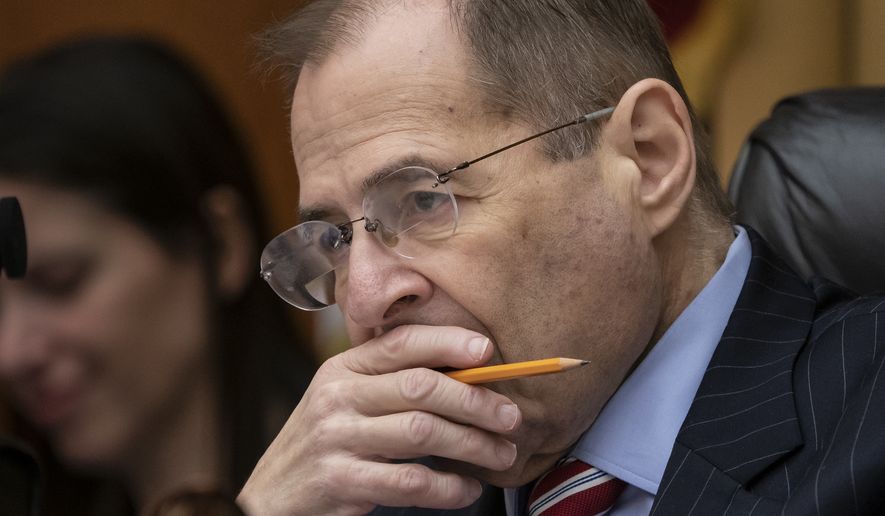The White House backed off President Trump’s blanket resistance to congressional investigations Wednesday but urged Democrats to go back and rethink the massive wave of demands they have made.
The move could strengthen the White House’s legal position — analysts said Mr. Trump’s total resistance was untenable — and suggests both sides are resigned to letting the courts sort it out.
White House Counsel Pat Cipollone laid out the position in a 12-page letter to House Judiciary Committee Chairman Jerrold Nadler, New York Democrat, saying it won’t be part of any “do-over” of special counsel Robert Mueller’s investigation into the 2016 presidential election.
“The fact of the matter is the White House isn’t going to cooperate with this type of presidential harassment,” a White House official told reporters.
But the official and Mr. Cipollone said they will cooperate on “legitimate” investigations.
Democrats weren’t impressed. Mr. Nadler said he won’t let the White House dictate what is legitimate and what is not.
The chairman said Mr. Cipollone’s letter amounted to a demand to stop his investigation.
SEE ALSO: William Barr asks Nancy Pelosi: ‘Madam Speaker, did you bring your handcuffs?’
“We will do no such thing,” he said. “This flies in the face of the American idea that no one is above the law, and I reject it. Our investigation into this as well as other troubling conduct by this administration will continue.”
What powers House Democrats have to pry loose information, though, remains up for debate.
The most obvious avenue is going to court and letting judges sort out what Congress is entitled to see and what Mr. Trump can shield.
But Mr. Nadler and fellow committee chairs are increasingly agitating for Congress to use their own “inherent contempt” powers, which would mean having the sergeant-at-arms arrest obstructionist officials and either detain or fine them.
Rep. Adam B. Schiff, California Democrat and chairman of the House Permanent Select Committee on Intelligence, said this weekend that he wants to use that tool. Mr. Nadler agreed Wednesday.
“It was the main procedure used for 150 years, and we may have to do it again,” he told reporters.
Asked what sort of fines might be imposed, he was succinct: “very large amounts.”
House Majority Leader Steny H. Hoyer, Maryland Democrat, poured cold water on the idea.
“I don’t want to deny that we have inherent contempt authority, but we’re somewhat limited in our ability to carry that out,” he said.
He also said not to expect any floor votes on contempt proceedings until next month. He said leaders want to wait for a critical mass of contempt violations before tackling them.
“We don’t want to do it just individually,” he said.
Mr. Nadler’s committee last week voted to recommend holding Attorney General William P. Barr in contempt for refusing to turn over the entire unredacted special counsel’s report and its supporting evidence.
The Ways and Means Committee, meanwhile, has issued a subpoena to obtain Mr. Trump’s tax returns.
The House intelligence committee has issued its own subpoena for the full Mueller report, and the Ways and Means Committee subpoenaed the IRS to demand it turn over Mr. Trump’s tax returns for the past six years.
Both of those could eventually result in contempt proceedings.
The Treasury Department says it won’t turn over the tax returns because it doesn’t want to “weaponize” the IRS for political purposes. Secretary Steven T. Mnuchin said Wednesday that he is willing to let a court sort it out.
Meanwhile, Mr. Trump has asserted executive privilege over the Mueller report in order to shield it.
Mr. Nadler held a hearing Wednesday to examine the scope of Mr. Trump’s privilege claims, and a prominent constitutional law professor said the chairman should be careful how he proceeds.
Jonathan Turley, a professor at George Washington University, said House Democrats could be making a mistake if they pursue their contempt claims against Mr. Barr.
Mr. Barr has expressed a willingness to negotiate on access to some of the redactions from the report but said it would be illegal to release grand jury information, which was part of Mr. Nadler’s original subpoena.
Mr. Turley said a recent decision by the U.S. Circuit Court of Appeals for the District of Columbia imposed new restrictions on the release of grand jury information.
He said Democrats are “heading into a world of hurt” if they went to court demanding that Mr. Barr unilaterally release that information.
“I encourage you not to push that button because my guess is that it will create new precedent and you wouldn’t like it,” he said.
The White House urged House Democrats to step back and rethink the full-court investigative press and suggested that lawmakers might have better luck finding areas of accommodation if they did.
The White House official briefing reporters Wednesday said one example of that is over security clearances, where the White House has worked to make information available to House Oversight and Reform Committee Chairman Elijah E. Cummings, Maryland Democrat.
• Jeff Mordock contributed to this report.
• Stephen Dinan can be reached at sdinan@washingtontimes.com.
• Gabriella Muñoz can be reached at gmunoz@washingtontimes.com.




Please read our comment policy before commenting.